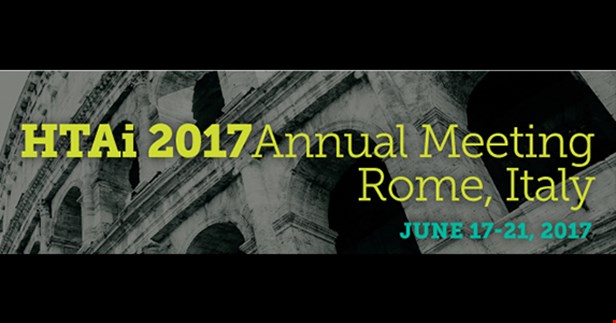HTAi Conference: Towards a Globalised Approach and Patient Involvement
 ©HTAi
©HTAi
EPF participated in the latest HTAi Conference in Rome, where international experts discussed the way forward for health technology assessment (HTA) processes, including a more holistic and multi-criteria approach, with increased patient involvement.
The conference, entitled “Towards an HTA Ecosystem: From Local Needs to Global Opportunities” highlighted the many challenges and possibilities of a multidimensional, multi-stakeholder and multi-criteria HTA approach.
A more holistic HTA system can be beneficial both in developed and emerging economies. Countries with well-developed health systems use it to avoid unnecessary costs; whilst for emerging countries, they are a way to make informed decisions on health services to be provided to their citizens. As emphasised by Stefano Vella, President of AIFA (Italian Medicines Agency), “a globalised HTA can be a supporting mechanism for countries with scarce resources”.
Patient involvement in HTA was another important topic of the conference, from its conceptualisation, through the definition of methodologies to increase its level, to its evaluation. New methodologies have been developed to gather patient input, such as for instance social media analytical methods, as outlined in the recent book to which EPF contributed.
The closing session focused on the ethical dilemmas of HTA and the need for decision-makers to have access to relevant data to make informed-decisions and mitigate the tension between public health and specific needs of patients living with chronic conditions.
Guido Rasi, Executive Director of the European Medicines Agency (EMA) explained that using common sets of data and methodologies in evidence generation for HTA decisions would generate efficiency gains for the entire process. He also stressed that “pricing and reimbursement decisions should never compromise or challenge regulatory decisions”.
Concluding the day, Prof. Norman Daniels stressed that current HTA standard tools “leave important questions unanswered” and presented his theory of “Accountability for Reasonableness”. According to him, embedding HTA in a fair deliberative process, would help answer the questions decision-makers ought to address on the impact of their actions. He then listed the sine-qua-non conditions to be met in order to make a well-informed decision:
- Publicity/transparency of the process;
- Revising the decisions in case of new available evidence;
- Enforceability of the decisions made.
From a patient perspective, the fairness of the process and inclusion of these conditions are key to the acceptability of decisions and should alleviate the sense of competition that sometimes can be found within the patient community.
What is HTA?
Health technology assessment (HTA) measures the added value of a new health technology in comparison to existing technologies/current standard of care.
For more information, see our recent factsheet on HTA.
For more information contact Valentina Strammiello at valentina.strammiello@eu-patient.eu
